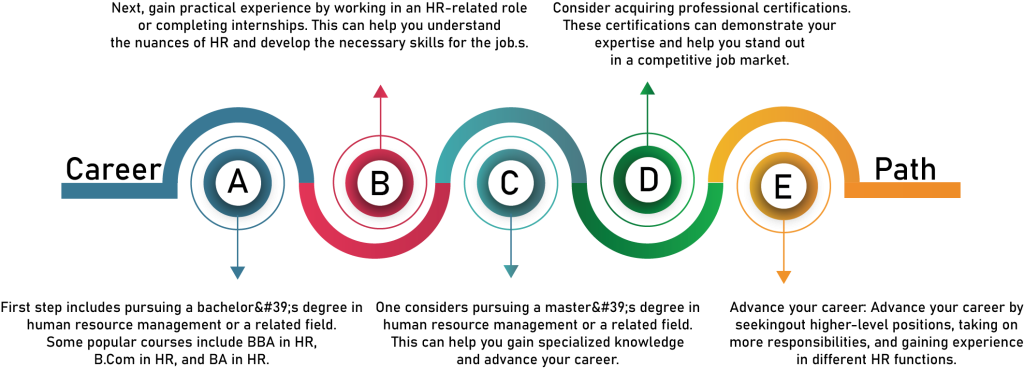Human resources (HR) refers to the people who work for an organization, and the department
responsible for managing and coordinating the employment and development of these individuals. The
role of HR is to ensure that an organization has the right people with the right skills, knowledge, and
experience to meet its objectives.
The work of HR can be divided into several areas, including recruitment and selection, training and
development, compensation and benefits, performance management, employee relations, and
compliance with employment laws and regulations.

Work description
HR is responsible for attracting and hiring new employees. This involves writing job descriptions,
advertising vacancies, reviewing resumes, conducting interviews, and selecting the best candidates for
the job.
They provide training and development opportunities to employees to help them acquire new skills and
knowledge, and to improve their performance on the job.
HR manages employee compensation and benefits, including salaries, bonuses, health insurance,
retirement plans, and other benefits.
Also, they set performance goals and objectives, providing feedback on performance, and conducting
performance evaluations.
They are also responsible for ensuring that the organization complies with employment laws and
regulations, such as those related to equal employment opportunity, workplace safety, and employee
privacy.
High Demand
Job stability: HR is a critical function in organizations and is always in demand.
Lucrative salaries
Variety of roles: HR offers a wide range of roles, including recruitment, training, employee
relations, compensation, and compliance.
Opportunities for innovation
Opportunities for growth: HR professionals can advance their careers by acquiring new skills and
experience, and by moving into higher-level positions.
Versatility
Rewarding work: HR professionals have the opportunity to make a meaningful impact on the
lives of employees and the success of the organization.
Flexibility
Flexibility: HR jobs can offer flexible work arrangements, such as remote work or flexible
schedules.
High stress
Administrative tasks: HR can involve a lot of paperwork and administrative tasks, such as
maintaining employee records and processing benefits.
Long hours
High expectations: HR professionals are often expected to be knowledgeable about a wide range
of topics, including employment laws and regulations, and to handle complex and sensitive
issues.
Competitive field
Emotional burden: HR professionals often have to deal with employee grievances and conflicts,
which can be emotionally taxing.
Constant learning
Limited decision-making power: HR professionals may not have the final say on major business
decisions, and their role may be primarily advisory.
Isolation
Potential for burnout: HR can be a high-pressure job, particularly in fast-paced or high-stress
environments.
The cost of pursuing a career in human resources in India can vary depending on several factors such as
the level of education and institution, mode of study, and location.
Pursuing a Bachelor's degree in Human Resource Management can cost between INR 30,000 to INR
1,50,000 per year depending on the college and location.
Pursuing a Master's degree in Human Resource Management can cost between INR 50,000 to INR
5,00,000 per year depending on the college and location.
Pursuing a professional certification in human resource management, such as the SHRM or HRCI
certification, can cost between INR 30,000 to INR 1,50,000 depending on the type of certification and
the training provider.
HR professionals can pursue various training and development courses throughout their career, which
can range from INR 5,000 to INR 50,000 per course.
[wpcharts type=”horizontalbarchart” bgcolor=”red:gray:yellow,blue:gray:yellow,random:gray:yellow,purple:gray:yellow” min=”0″ legend=”true” titles=”2 year , 5 year” values=”3,7,5,12″]
The earning potential of human resources in India can vary depending on several factors such as the
level of education, experience, industry, and location.
The salary for entry-level HR positions, such as HR Assistant or HR Coordinator, can range from INR
2,00,000 to INR 4,00,000 per year.
The salary for mid-level HR positions, such as HR Manager or HR Business Partner, can range from INR
6,00,000 to INR 12,00,000 per year.
[wpcharts type=”horizontalbarchart” bgcolor=”red:gray:yellow,blue:gray:yellow,random:gray:yellow,purple:gray:yellow” min=”0″ legend=”false” titles=”Entry-Level, Mid-Career, Senior-Level ” values=”5,15,25,35,45,55″]
Strong communication skills.
Empathy and emotional intelligence.
Good problem-solving and decision-making abilities.
Attention to detail.
Strong organizational skills.
Ability to work under pressure and manage multiple tasks simultaneously.
Good at building and maintaining relationships.
Lack of communication skills.
Inability to handle stress and pressure.
Poor time management and organizational skills.
Lack of attention to detail.
Inability to work well with others or build relationships.
Work-life balance
The work-life balance of human resource professionals can vary depending on the company, industry,
and job role.
Some companies prioritize work-life balance and offer flexible work arrangements, while others may
have a more demanding work culture.
The level of responsibility and workload can vary based on the HR role. For example, a recruitment
specialist may have to work longer hours during hiring periods, while an HR generalist may have a more
consistent workload.
Certain industries, such as consulting or finance, may have a more demanding work culture than others.
Work-life balance can also vary based on the location of the job. For example, metropolitan cities may
have a higher cost of living and longer commute times, which can impact work-life balance.
In general, HR professionals may experience some pressure to be available outside of regular working
hours to handle employee issues or emergencies. However, many companies also offer flexibility in
terms of work hours and remote work arrangements.

HR professionals can play a critical role in creating a positive work environment that supports
employee well-being.
HR strategies and initiatives can contribute to improved company performance by fostering
employee engagement, productivity, and retention.
HR professionals can help shape company culture by promoting values such as diversity, equity,
and inclusion.
HR professionals can play a strategic role in driving business objectives by aligning HR initiatives
with organizational goals.
HR professionals can leverage technology and data analytics to innovate HR practices and
improve efficiency.
Many HR professionals find their work fulfilling due to the opportunity to make a positive impact
on employee well-being and company performance.
Artificial Intelligence Machine Learning
Involves developing algorithms that enable machines to learn from data and make decisions without human intervention.
Cyber security
Focuses on protecting computer systems, networks, and sensitive data from unauthorized access, attacks, and theft.
Software Engineering
Involves designing, developing, and maintaining software applications and systems.
Data Science Machine Learning
Involves processing, analyzing, and interpreting large and complex data sets using statistical and computational methods.
Computer Networks
Focuses on designing, implementing, and maintaining computer networks that enable communication and data transfer between devices.
Conclusion:
In Conclusion, pursuing a Career in Computer Engineering in India requires a Strong Foundation in math and science, a passion for technology, and a willingness to continuously learn and adapt to New Developments in the industry. With competitive salaries, opportunities for career growth, and the potential to make a significant impact on society, computer engineering can be a Rewarding and Fulfilling Career choice for those who are up for the challenge.



